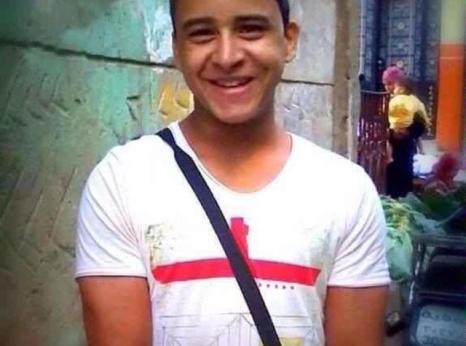Egypt: Health Risk For Detained Anti-Torture T-Shirt Protester

Security forces first arrested then 18-year-old Mahmoud Hussein on 25 January 2014, in the aftermath of protests marking the third anniversary of the 25 January Revolution. Security forces stopped him at a checkpoint in the neighbourhood of El-Marg, northern Cairo, when he was returning home on a bus from protests, and arbitrarily arrested him simply because he was wearing a T-shirt with the slogan “A Nation Without Torture” and a scarf with the emblem of the January 25 Revolution. Amnesty International documented how, following his arrest in 2014, National Security Agency officials subjected him to torture and other ill-treatment, including beatings and the use of electric shocks to his hands, back and testicles. As a result of the torture, he was forced to “confess” to belonging to a banned group, possessing Molotov cocktails and hand grenades, and participating in unauthorized protests, with his forced “confession” recorded on video. The day after he “confessed” on camera, Mahmoud Hussein was taken for questioning by the Supreme State Security Prosecution (SSSP). He denied all the accusations and said he had been tortured to “confess”, but the prosecutor did not refer him for forensic examination or order any investigation into his torture allegations. Mahmoud Hussein stayed in El-Marg police station for six days and was later transferred to Abu Zaabal Prison where he was beaten upon arrival. In May 2014, he was transferred to the Cairo’s Tora Appeal Prison, where he was also subjected to beatings on at least two occasions. He was eventually transferred Cairo’s Tora Investigations Prison. He remained in pretrial detention under case number 715 of 2014 in El-Marg and was referred for trial on 31 January 2016. On 24 March 2016, he was released on bail of 1,000 Egyptian pounds.
Mahmoud Hussein is currently held in Badr 1 Prison, located 70 km northeast of Cairo. According to Amnesty International’s previous research, prisoners there complain of cruel and inhumane conditions characterized by deliberate denial of healthcare, exposure to extreme cold and constant camera surveillance. Family visits for other prisoners are only allowed every two months for 20 minutes and are conducted through a glass barrier preventing direct and physical contact with loved ones. This is in breach of Egypt’s prison regulations that stipulate weekly visits lasting no less than 45 minutes for detainees in pretrial detention.
Mahmoud Hussein’s renewed arrest comes amid a wave of fresh arrests of critics and relatives of dissidents based abroad. In August 2023, the authorities arrested the fathers of Egyptian journalist Ahmed Gamal Ziada, based in Belgium, and German-Egyptian activist Fagr al-Adly, based in Germany. Both have been questioned about their sons’ activism. Another activist and former detainee Ahmed Hamdy al-Sayed, also known as “Gika”, was rearrested in June 2023 and subjected to enforced disappearance until 27 August 2023, when prosecutors ordered his detention pending investigations into bogus accusations of “spreading false news”. Prominent opposition politician Hisham Kassem has also been arbitrary detained since 20 August 2023, solely for exercising his right to freedom of expression. On 16 September, he was convicted of defamation, “insulting” officials and other politically-motivated charges and sentenced to six months in prison and a monetary fine. On 2 September 2023, prominent activist Mohamed Adel was sentenced to four years’ imprisonment on bogus charges of “spreading false news”. These unrelenting arrests and prosecutions expose the authorities’ lack of genuine commitment to reform, despite the recent releases of a handful of critics and the long-awaited launch of the National Dialogue with elements of the political opposition in May 2023.
From 1 August to 13 September 2023, Amnesty International recorded the arrest, interrogation by the SSSP and detention pending investigations of at least 385 individuals over accusations of belonging to terrorist groups, “spreading false news” or “misuse of social media”. Similar charges in new cases were brought by the SSSP against at least 17 individuals who had been held in prolonged pre-trial detention, in a practice commonly referred to as “rotation”. During the same period, 47 individuals held for political reasons have been released by the SSSP pending investigations or through presidential amnesty.